CAIRO - 24 May 20120: Shiam Badr, a yoga teacher who started giving online classes as part of her work at a studio after the novel coronavirus outbreak in Egypt, first thought it would be difficult to teach online because a hands-on approach is crucial, in addition to the “positive vibes” she gets during a regular class.
Much to her surprise, people online focus on her instructions and “do their best to do the poses correctly just by active listening, something we all need to work on,” she says. In a regular class, people watch her demonstrations and follow her moves, rather than listen actively to the instructions, she explains. During the pandemic, Shiam teaches practices claimed to boost immunity and reduce anxiety and depression, namely breathing techniques and inversions, postures where a person is upside-down, from an easy pose like the downward-facing dog to an advanced handstand.
 yoga teacher Shiam Badr
yoga teacher Shiam Badr
Although her pay has been affected, as both a teacher’s remuneration and a client’s fee are lower online, virtual yoga has given her more exposure because she teaches a segment of clients she never met in a regular class. “Yoga changed my whole lifestyle. I’m a firm believer that yoga is not about touching your toes and doing handstands, it is a lifestyle. I became healthier, happier, more fit and calm by learning how to focus on the present and enjoy every single moment,” Shiam says enthusiastically.
In fact, this is one of the reasons why she would love to continue teaching yoga online even after the lockdown comes to an end. She wants to share yoga knowledge with those who cannot go to a studio due to the distance or physical conditions, she tells Egypt Today, pointing out senior citizens as an example, as she teaches them chair yoga online.
A business in crisis
The World Health Organization mentions yoga as one of the exercises one should do during this difficult time of vulnerability to infection and lack of physical activity. But while some yoga studios offer courses online, with a number of independent yoga teachers who already have a fan base on social media opting to give free live classes, yoga studio owners have been crippled by the ongoing pandemic. All have had to shut their studios down, partly owing to a government order and partly owing to their sense of responsibility.
Yoga teacher and studio owner of four years Cherie Ayman tells Egypt Today that online courses do not cover the costs of the rent of her studio in the upscale district of Zamalek, or the salaries of the teachers. However, her studio is one of the most active ones during the lockdown, with various styles of yoga and meditation available through their online platforms, something deeply appreciated by many people in self-quarantine.
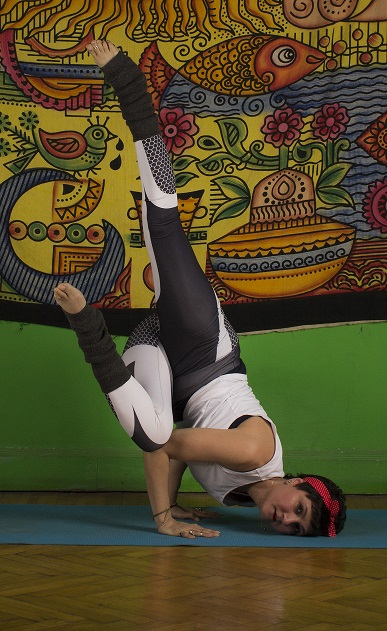 Yoga teacher and studio owner Cherie Ayman
Yoga teacher and studio owner Cherie Ayman
Cherie is trying to make the most of the crisis, but as a businesswoman she raised an important issue in Egypt that may limit the number of online students: the inconvenience of online payment. Paying online is still practiced on a small scale in the country, even if using credit/debit cards at stores is slowly becoming more popular. Some people worry about using their credit cards online, and during a lockdown and nightly curfew, it is a major hassle to go to a bank to transfer the fee, activate internet banking, or go to a branch of a mobile network to transfer the money just to pay for a yoga course.
If the demand on online yoga will continue after the lockdown, Cherie will happily follow the lead, as online yoga is cheaper for the clients, and some teachers and students may prefer to practice from home due to certain circumstances, temporary or not.
Problems that may occur while teaching online include slow internet connection, an issue many have complained about since the lockdown. But what Cherie misses the most is the “physical intervention to correct alignment, as well as the little massages, eye pillows and aroma therapy I give my students by the end of every class. It’s when I feel the student has benefited the most,” she says. Nevertheless, Cherie’s feedback on live meditation classes is quite positive, as all the student needs is a calm spot.
Other yoga teachers believe they have a social responsibility and are trying to share what they know. Anju Singh is the yoga teacher of the Maulana Azad Center for Indian Culture in Cairo and is giving free online yoga classes organized by the Indian Embassy. For Anju, it is not just a job, and not just helping others. As a foreigner in Egypt, away from family, and practicing social distancing, teaching online has given her the opportunity to “stay connected to hundreds of Egyptian friends . . . I feel extremely overwhelmed by the support provided to me by my students and Egyptian friends here,” she tells us.
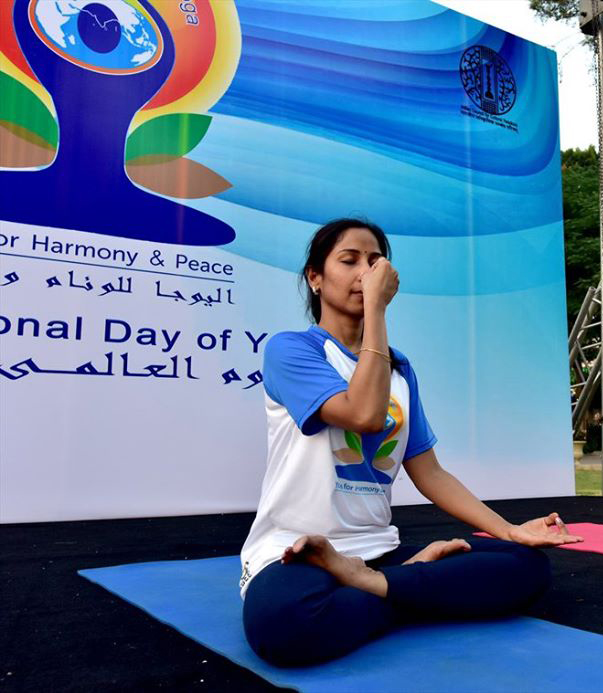 Anju Singh during the International Day of Yoga - Maulana Azad Center for Indian culture
Anju Singh during the International Day of Yoga - Maulana Azad Center for Indian culture
Like most yoga teachers, she misses the physical intervention to correct alignment, and has issues with internet connectivity, audio quality and the placement of cameras, her own and the students’. However, online yoga “helps teachers reach out to the maximum number of people possible to help them stay healthy and positive,” she says, adding that she focuses on mobility and boosting immunity through asanas (yoga postures). She also teaches pranayama (breathing techniques) for the effective functioning of the respiratory system and nourishing the body with extra intake of oxygen, as well as meditation to uplift energy levels and induce positivity.
“In short, we are sailing together towards overall well-being through yoga in these tough times. Yoga teachers have an important role to play. We all need to come together for the wider dissemination of information about the benefits of practicing yoga for overall well-being of the population,” she adds.
Silver lining
Globally yoga is a multimillion-dollar industry and the quarantine has proved to be a great time for yoga teachers who want to promote and market themselves. Free live classes and guided meditation increase their fan base, and they are sure to see more customers after the lockdown.
Aia Faham, a yoga teacher and retreat leader with a solid fan base, launched Egypt Yogis “Official Group” on Facebook as the coronavirus crisis unfolded. She gives 30-40 minutes of yoga classes on the platform for free, creates competitions for the over 4,000 members to encourage them to practice, with free gifts of private sessions for the winners. She also allows members to choose online “yoga buddies” to help stay on track of the practice, as well as other ideas.
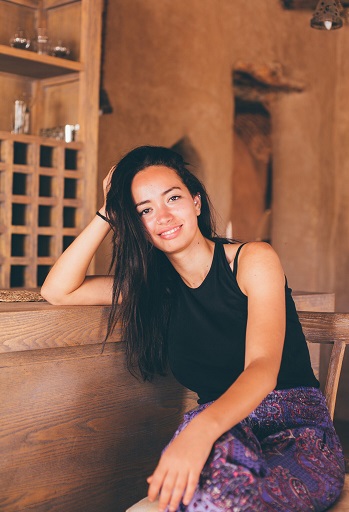 Yoga teacher and retreat leader Aia Faham
Yoga teacher and retreat leader Aia Faham
It was just the time to “give back,” Aia says. “Yoga has given me quite lot of things and has dramatically changed my life. I am getting quite a lot of other things other than money. Building a community is something we can build on later.”
Her online classes are much like her regular classes in terms of the content, varying from philosophy to practice and pranayama, but just a little shorter so it’s easier for everybody to follow, and though she doesn’t meet with her clients, she still gets to interact with her followers and see their comments.
Aia says this is an “intense time for yoga teaching to come to life. . . . This was a really good time for me to give the teachings and live the teachings as well. It was a time for all of us to sit, reflect and see if we are living the yoga teaching on the mat and off the mat.”
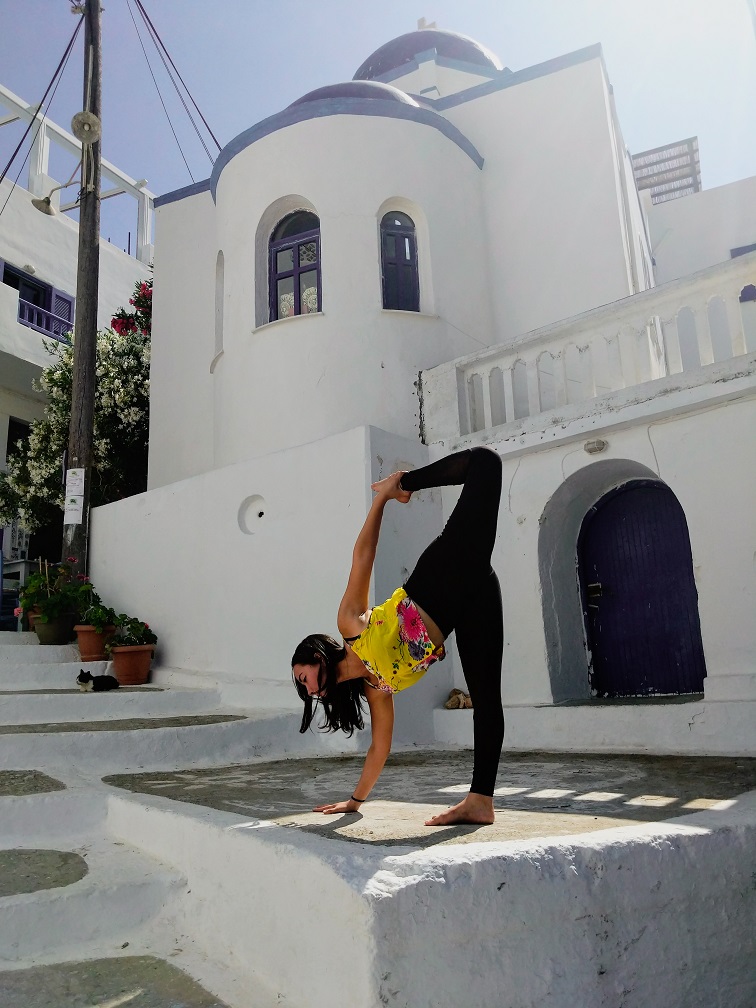 yoga teacher Aia Faham
yoga teacher Aia Faham
Yoga . . . coming home to Egypt
Yoga is not new in Egypt, quite literally, as depictions and text on temples and papyrus show postures and advanced concepts that are now known as yoga. As yoga comes home, it is getting more and more popular in the country with various local groups that create internationally recognized yoga teacher training, and graduate dozens of yoga teachers every quarter. The courses are usually carried out by teachers from Egypt, India, Europe and Sub-Saharan countries, and with the convenience of being held in Egypt at an overall cheaper cost than traveling to India, more people are becoming interested.
Shiam says she could not travel to India for her own training for a month because of her kids, though she would have loved the experience and living in the ashram, a spiritual hermitage where yoga teacher training is usually conducted. When she decided to take her training in Egypt, it was because she did research and came to the conclusion that the quality of a local training would be the same as one in India, plus the convenience of being with her family.
“That quality yoga teacher training is available in Egypt is a very nice thing. I have attended two teacher training courses, and all participants shared the love of yoga regard - less of their backgrounds and levels. No one was there just to take a certificate, especially that paying some LE 20,000 is still not cheap,” Shiam says.
Aia recommends that everybody should take a yoga teacher training at least once in their lifetime, but that “does not mean they have to be teachers, it is just for them to grow and evolve. Taking the yoga teacher training and having lots of yoga teachers is really beautiful. . . . More people are being health conscious, have higher awareness and are becoming more self-aware and connected to something higher,” she adds.
Among the expat yoga enthusiasts who arrived for their training in Egypt is Jackie Jackob, who says the experience gave her an opportunity to “not only learn about yoga on a deeper level, but also to learn more about Egypt and yoga’s deep history in the ancient Egyptian culture.”
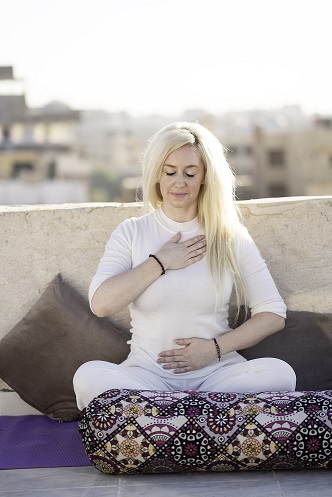 Yoga teacher Jackie Jacob
Yoga teacher Jackie Jacob
Having worked for years in digital marketing, the U.S. national, who likes to infuse her classes with elements from her travels across India, Peru and African countries, says the lock - down represented an opportunity for her to combine her yoga and marketing skills. She is accustomed to Zoom and Skype meetings, so the transition to move things online came naturally when teaching groups and private classes. She is grateful for lockdown because it has given her an opportunity to journey inward, reflect, and perfect her skills as a yoga teacher and share her yoga practice with viewers, whether paid or for free.
Looking ahead when the lockdown is lifted, yoga practitioners would be grateful if online classes remained available. Farida Rostom, an avid yoga practitioner says that though she prefers regular classes where she has the sense of belonging to a community, online classes “are a lot easier to access than a regular class. I would like to continue with online classes after the lockdown but it would not be my priority. They would be a great option in days I would not have the time to commute to the studio or not really wanting to drive,” Rostom explains, adding that online classes are easier to set on her schedule, and she likes the fact that they are interactive, unlike a YouTube video.
The experience of a student with every yoga teacher is different, and the experience of a teacher with every teacher training is also different. As Aia puts it, a yoga teacher “gets to connect to people and deal with their traumas, insecurities and the injuries in their bodies. Teaching yoga is a very beautiful, sensitive and a very deep kind of thing.”
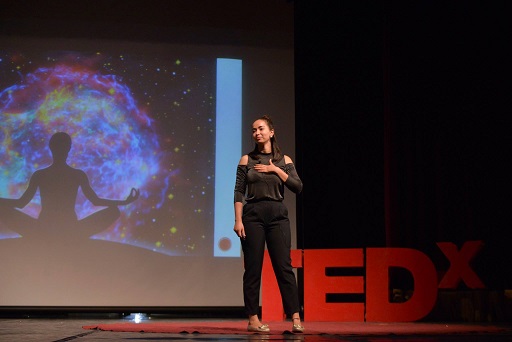 Aia Faham in a TEDx Talk
Aia Faham in a TEDx Talk
The yoga instructor has high hopes for the community at large after the lockdown, particularly for Egypt Yogis movement. Her plan is to continue the free online classes, with more teachers on stage, a complete online program, free weekly gatherings where community members meet, practice and exchange ideas on healthy living. To make it sustainable, she wants to look for sponsors later on.






Comments
Leave a Comment